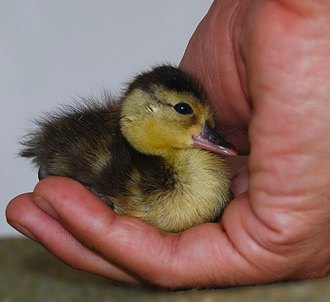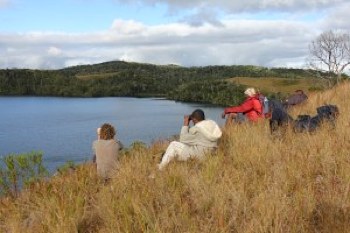 On a remote lake in Madagascar, a fateful discovery of 22 ducks belonging to a variety thought to be extinct, inspired a group of conservationists to mobilize a last ditch effort to save the species, which had been previously been written off.
On a remote lake in Madagascar, a fateful discovery of 22 ducks belonging to a variety thought to be extinct, inspired a group of conservationists to mobilize a last ditch effort to save the species, which had been previously been written off.
This week, as the Madagascar pochard’s only remaining wild population hangs on with just 22 adult birds and a few ducklings surviving, the captive breeding program started in 2009 celebrated a huge success with the birth of 18 new babies.
In 2009, Britain’s Wildfowl and Wetlands Trust (WWT) sent a team of experts to Madagascar and, with the blessing of the local community, to collect eggs from the wild and set up a local breeding program.
Within the space of a few months 23 ducklings successfully hatched in captivity, doubling the population of the species. Now two years old, those same babies are grown and are successfully breeding at the specially-designed center in Antsohihy, Madagascar, bringing the total world population to 60.
“Conservation breeding is just one part of a complex conservation plan,” according to WWT and its project partner, Durrell Wildlife Conservation Trust. “As well as providing insurance against extinction, it will enable us to release birds on other lakes to expand the population”
So, in tandem, the scientists are studying the remaining wild birds to work out the reasons behind the species’ decline and determine the right conditions for releasing birds into the wild.
Dr Andy Bamford, a WWT researcher, has been in Madagascar studying the wild birds. Andy writes:
“When a species is close to extinction, its last hiding place can literally be just that – the last place it would choose to hide. It appears that is true for the pochards. They are surviving on this lake because it’s so remote, but it is far from ideal for them.”
 “Our initial investigations suggest there is too little food. Few ducklings are surviving beyond a couple of weeks and I suspect that they simply don’t have the strength to dive as deep or for as long as the adult birds in order to get to the invertebrates at the bottom of the lake. They are literally starving to death.”
“Our initial investigations suggest there is too little food. Few ducklings are surviving beyond a couple of weeks and I suspect that they simply don’t have the strength to dive as deep or for as long as the adult birds in order to get to the invertebrates at the bottom of the lake. They are literally starving to death.”
After conducting a search of lakes and wetlands in Madagascar to find possible release sites, several were identified as physically fit for the pochard, but a crucial factor will be whether the local community is supportive of the project.
“Madagascar is an extremely poor country and if you live by a lake you may well survive on fishing. We suspect that uncontrolled fishing is in part behind the decline of the pochard nationally. As they dive for food they are susceptible to getting caught in nets below the surface and then drowning. Any reintroduction programme will therefore have to be carried out with the support of local communities – to ensure that people, ducks and other wildlife can co-exist happily.”
Any donation you can make to this cause will be important in helping to run the breeding program in Madagascar and save the Pochards from a once-imminent extinction. Visit the WWT website now to find out how to help.
(READ or watch a feature story at BBC)
WATCH the video from the initial rescue of the pochard eggs in the wild, and the baby duckling home video at the bottom…



















